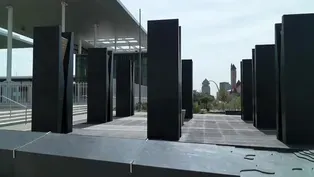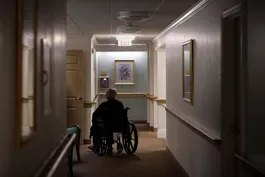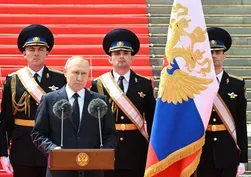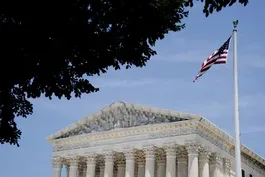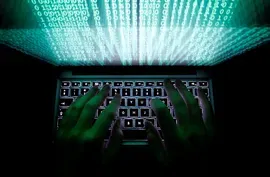
Book calls for renewed commitment to American citizenship
Clip: 6/27/2023 | 8m 1sVideo has Closed Captions
New book 'The Bill of Obligations' calls for renewed commitment to American citizenship
For a more optimistic take on the future of our country, a new book released earlier this year provides some answers. "The Bill of Obligations: The Ten Habits of Good Citizens" argues democracy works best when citizens recognize their rights and their duties. Amna Nawaz sat down with its author, Richard Haass, a veteran diplomat and president of the Council on Foreign Relations, to discuss more.
Problems with Closed Captions? Closed Captioning Feedback
Problems with Closed Captions? Closed Captioning Feedback
Major corporate funding for the PBS News Hour is provided by BDO, BNSF, Consumer Cellular, American Cruise Lines, and Raymond James. Funding for the PBS NewsHour Weekend is provided by...

Book calls for renewed commitment to American citizenship
Clip: 6/27/2023 | 8m 1sVideo has Closed Captions
For a more optimistic take on the future of our country, a new book released earlier this year provides some answers. "The Bill of Obligations: The Ten Habits of Good Citizens" argues democracy works best when citizens recognize their rights and their duties. Amna Nawaz sat down with its author, Richard Haass, a veteran diplomat and president of the Council on Foreign Relations, to discuss more.
Problems with Closed Captions? Closed Captioning Feedback
How to Watch PBS News Hour
PBS News Hour is available to stream on pbs.org and the free PBS App, available on iPhone, Apple TV, Android TV, Android smartphones, Amazon Fire TV, Amazon Fire Tablet, Roku, Samsung Smart TV, and Vizio.
Providing Support for PBS.org
Learn Moreabout PBS online sponsorshipGEOFF BENNETT: We often hear deep concerns about the state of American democracy, but a new book provides some optimistic advice and answers.
"The Bill of Obligations: The Ten Habits of Good Citizens" argues that democracy works best when citizens recognize not just their rights, but also their duties.
Amna spoke with its author, Richard Haass, a veteran diplomat and outgoing president on the -- of the Council on Foreign Relations.
AMNA NAWAZ: Richard Haass, welcome back to the "NewsHour."
Thanks for joining us.
RICHARD HAASS, Author, "The Bill of Obligations: The Ten Habits of Good Citizens": Great to be with you.
AMNA NAWAZ: So, you write in this book, the greatest threat to America right now comes from within, as you say, from political divisions that for only the second time in U.S. history have raised doubts about the future of American democracy and even the United States itself.
You cite January 6, as proof of that.
And, as you know, a lot of people said, you know what, yes, January 6 was terrible, but the system held, democracy survived.
So why are you still worried?
RICHARD HAASS: Well, just because democracy survived that day, it doesn't mean we have the luxury of being sanguine.
This is a country where I -- it's all too easy to imagine frequent widespread politically inspired violence.
Our political institutions still are not really working as intended.
We can't pass much of the legislation we need in this country.
We can't meet many of our domestic challenges.
We are as polarized as we have ever been as a society.
And I'm not predicting the worst.
I'm simply saying no one can be confident that the best will happen, that we're somehow out of the woods.
So we ought to be worried and we ought to do something about it.
AMNA NAWAZ: Do you think the idea of American exceptionalism in some way prevents most Americans from seeing our democracy as vulnerable in any way?
RICHARD HAASS: That's interesting.
It might be that or simply momentum.
Here we are.
We're three years away from marking the 250th anniversary of the Declaration of Independence.
My guess is, most Americans take it for granted.
They have always lived in a democracy.
They also, I think, in many cases, don't study it.
We don't teach civics in our schools.
Or, if it's offered, it's not required.
You can graduate from virtually any college in America not having read the Constitution or the Declaration of Independence or The Federalist Papers, or knowing what citizenship requires, what the country requires of its citizens.
So, my sense is Americans aren't really alert as much as they should and could be to the danger that we're in.
AMNA NAWAZ: You write about the idea of citizenship and say it should be expanded.
You say we have been overly focused on rights.
And you lay out obligations you believe we should adopt and adhere to instead.
Why are these important?
RICHARD HAASS: Because a rights-based democracy, as important as rights are, won't simply be enough.
Think about it.
A woman's right to an abortion vs. the rights of the unborn, well, how do we navigate that?
Someone's right to bear arms, pursuant to the Second Amendment, someone else's right to public safety, how do we navigate that?
So, rights alone are not enough.
We need to think about obligations, the obligations each of us has to one another, that you and I have to one another.
We need to begin to reimagine citizenship as a coin.
One side is rights, but the other side must be our obligations.
AMNA NAWAZ: Let's get into a few examples here.
One of the obligations you lay out is to remain civil.
I don't need to tell you about the state of our political discourse these days.
How do you even begin to adopt and to enforce that kind of obligation?
RICHARD HAASS: I'm not sure you can enforce it.
You have got to basically persuade people, if I'm uncivil to you today, it's unlikely that you and I are going to have a working relationship on something else tomorrow.
So it's simply in our own self-interest.
But this is something for parents, for teachers.
What about religious authorities, the people who stand up and preach on Fridays, Saturdays and Sundays?
Just to call for civility is not calling for a policy position.
It's simply saying, this is what we owe one another.
We want to be treated well, and we have to therefore treat one another well.
AMNA NAWAZ: Another one of your obligations you lay out is to be informed.
And in the current landscape we have right now of those bad actors out there actively spreading misinformation and disinformation, we have leaders who are so far either unable or unwilling to rein in those actors or to stop the spread of bad information.
So, how do we ensure that we have an informed citizenry that's armed with good information?
RICHARD HAASS: Well, it's essential.
It was Jefferson who basically said that we need to be informed.
I think it's up to our schools.
So, making public education in this country better, I would say, needs to be the single highest public policy priority.
One thing I like going on, Amna, is, in New Jersey, there's now a requirement to teach information literacy in the schools.
The whole idea is not to teach young people what to think, but it's to teach them how to be an informed consumer, how to be a critical consumer of information in the age of the Internet.
How do you know a fact when you see one?
What's the difference between a fact and a misstatement?
And that's the sort of thing we could do much better at teaching in our schools.
AMNA NAWAZ: You talk as well about the lack of a shared national experience in America.
And it strikes me, based on a lot of our reporting, that much of the policymaking, decision-making has shifted to states, and where you live in America means you have a very different experience in terms of your rights and how you live.
Does the amount of power that our states currently have take away from our ability to have a shared national experience?
RICHARD HAASS: Look, you raise a really good point.
And I worry about that.
This is a country founded on an idea of Americanness, of equality of opportunity, certain principles.
When we were founded, though, we were a country of three million people.
Now we're more than 100 times that.
We're a country of 340 million people.
Much harder to operate.
And, in some cases, it may be better to do things at the state or the city or the county level.
But there's certain things that we can't.
There's got to be certain protections for all Americans when we act in the world.
Florida can't have a foreign policy that's somehow different from Ohio's, that's different from Oregon's.
We have got to have a single American foreign policy.
So, there are certain things that cannot be done at the state or local level.
AMNA NAWAZ: Which brings me to the last obligation in your book.
You say, put country first.
And I will tell you, the people I talked to outside the Capitol on January 6 believed they were doing just that.
And many thought that their violence was justified.
Are you worried that we will see more and an increase in political violence ahead?
RICHARD HAASS: I am worried.
I spent years as the U.S. envoy to Northern Ireland.
The three decades of political violence there known as the Troubles, we could have a version of it here, particularly given how prevalent our guns -- guns are here.
But let me quote Ronald Reagan here.
In his -- I think it was his farewell address.
The former president said, it's not enough to be a patriot.
We need informed patriotism.
We need Americans to understand why certain actions are consistent with patriotism, why other actions are not.
So motives alone are not enough.
We need Americans to be informed about what makes this democracy so special, what it takes to protect it, why it's worth protecting.
AMNA NAWAZ: Richard, as we speak, you are stepping down as president of the Council on Foreign Relations after 20 years at the helm.
You have seen democracies rise and fall.
Are you optimistic that American democracy will survive?
RICHARD HAASS: I'm optimistic, or I wouldn't be writing this book.
On the other hand, I'm not sanguine, Amna.
I think we need to worry.
Look, right now, we live in a world where one democracy, Ukraine, is being threatened from without by invasion.
The much bigger problem historically for democracies is corrosion and eroding from within.
That is challenge -- that's the challenge facing the United States.
As big as China and Russia and North Korea and Iran are as challenges to United States, as threats, we are the biggest threat to ourselves.
The good news is, we have the potential to fix it.
AMNA NAWAZ: The book is "The Bill of Obligations: The Ten Habits of Good Citizens."
The author is Richard Haass.
Richard, thank you.
Good to speak with you.
RICHARD HAASS: Thank you, Amna.
Art project hopes to reveal forgotten history of St. Louis
Video has Closed Captions
Clip: 6/27/2023 | 6m 54s | Citywide art project hopes to reveal forgotten history of St. Louis (6m 54s)
How an aging population poses challenges for U.S.
Video has Closed Captions
Clip: 6/27/2023 | 9m 34s | How an aging population poses challenges for U.S. economy, workforce and social programs (9m 34s)
Leaked audio complicates Trump's legal troubles
Video has Closed Captions
Clip: 6/27/2023 | 5m 36s | Audio of Trump discussing classified material further complicates his legal troubles (5m 36s)
Russia drops charges against Wagner mercenary group
Video has Closed Captions
Clip: 6/27/2023 | 3m 53s | Russia drops charges against mercenary group as Putin attempts to project order (3m 53s)
Supreme court rejects independent state legislature theory
Video has Closed Captions
Clip: 6/27/2023 | 5m 13s | Supreme Court rejects legal theory that could have thrown 2024 election into disarray (5m 13s)
Women face new sexual harassment with deepfake pornography
Video has Closed Captions
Clip: 6/27/2023 | 8m 30s | Women face new sexual harassment with deepfake pornography (8m 30s)
Providing Support for PBS.org
Learn Moreabout PBS online sponsorshipSupport for PBS provided by:
Major corporate funding for the PBS News Hour is provided by BDO, BNSF, Consumer Cellular, American Cruise Lines, and Raymond James. Funding for the PBS NewsHour Weekend is provided by...
